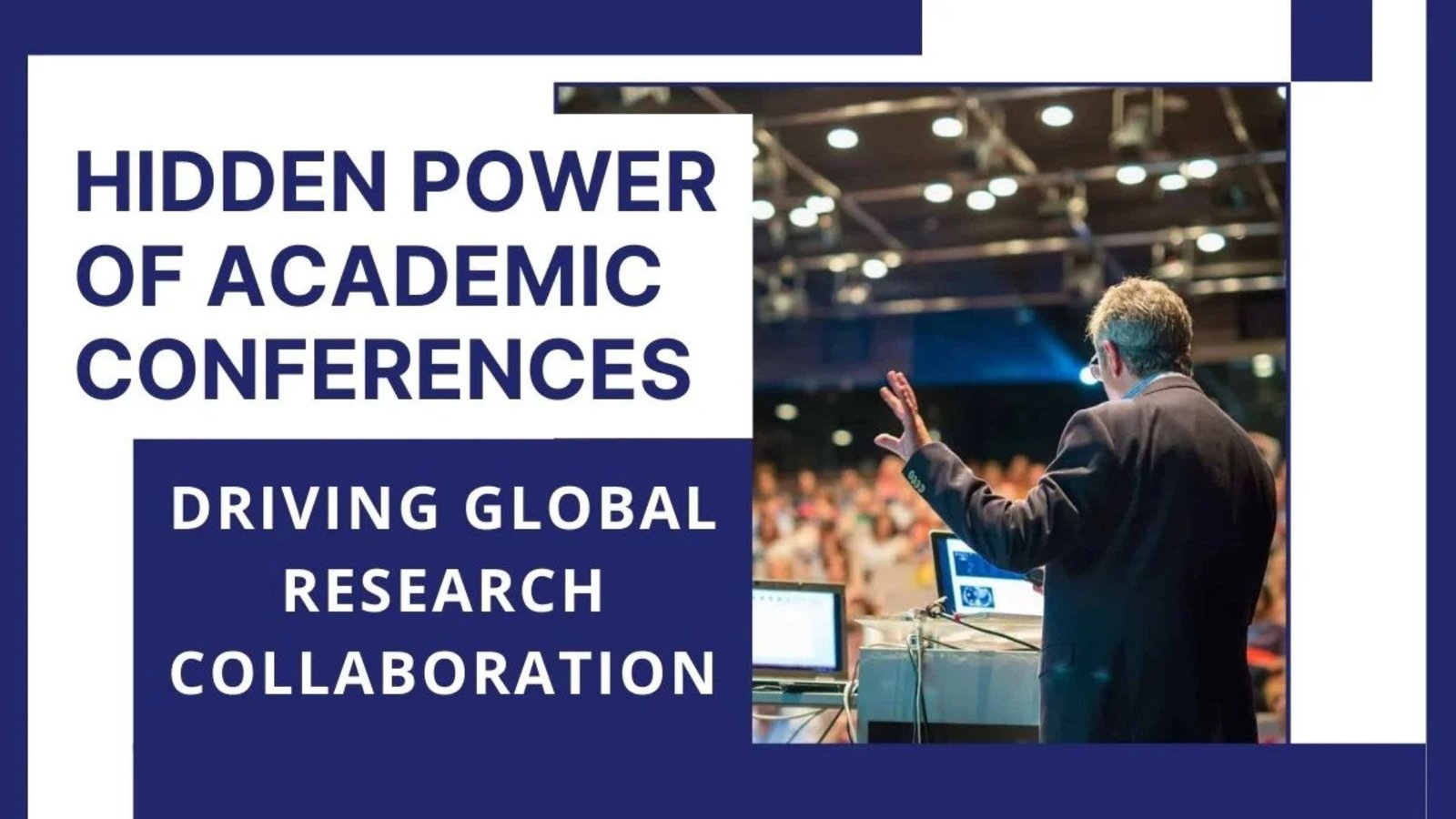Academic conferences are more than just gatherings of scholars—they’re dynamic hubs where ideas spark, partnerships form, and groundbreaking research takes shape. These events bring together researchers, students, and professionals from around the world, fostering collaboration that drives innovation. In this article, we’ll explore how academic conferences fuel global research collaboration, their benefits, challenges, and why they remain vital in today’s digital age.
What Are Academic Conferences?
Academic conferences are events where experts, researchers, students, and industry professionals meet to share knowledge, present research, and discuss advancements in their fields. These gatherings can range from small, niche workshops to large international symposiums, covering topics from science and technology to humanities and social sciences.
Unlike casual meetups, academic conferences are structured, often featuring keynote speeches, panel discussions, poster sessions, and workshops. They provide a platform for attendees to showcase their work, learn from others, and build networks that can shape their careers and research outcomes.
Why Academic Conferences Matter for Global Research
Academic conferences play a pivotal role in advancing research by connecting people across borders, disciplines, and institutions. Here’s why they’re essential for global collaboration:
1. Bridging Geographical and Cultural Gaps
Conferences bring together diverse minds from different countries, creating opportunities for cross-cultural exchanges. Researchers from varied backgrounds share unique perspectives, which can lead to innovative solutions to global challenges like climate change or public health.
2. Encouraging Interdisciplinary Collaboration
Many conferences focus on interdisciplinary themes, allowing experts from fields like biology, engineering, and social sciences to collaborate. This mix of expertise often results in creative approaches to complex problems.
3. Accelerating Knowledge Sharing
Presentations, workshops, and panel discussions at academic conferences allow researchers to share their findings quickly. This rapid exchange of ideas helps prevent duplication of efforts and inspires new research directions.
4. Building Professional Networks
Conferences are networking goldmines. They connect early-career researchers with seasoned experts, fostering mentorships and partnerships that can lead to joint projects, publications, or funding opportunities.
How Academic Conferences Drive Collaboration
Academic conferences create an environment ripe for collaboration through various formats and activities. Here’s a closer look at how they make this happen:
Keynote Speeches and Plenary Sessions
High-profile speakers share cutting-edge insights, setting the tone for collaboration. These talks often highlight emerging trends, inspiring attendees to explore new research avenues together.
Paper and Poster Presentations
Researchers present their work through papers or posters, inviting feedback and sparking discussions. These interactions often lead to partnerships as attendees discover shared interests.
Workshops and Roundtables
Smaller, interactive sessions like workshops allow for hands-on learning and brainstorming. Roundtables encourage open dialogue, where researchers can pitch ideas and find collaborators.
Networking Events
From coffee breaks to gala dinners, informal settings at academic conferences help attendees build personal connections. These relationships often translate into long-term research collaborations.
Virtual and Hybrid Formats
With the rise of digital platforms, academic conferences now offer virtual or hybrid options, making it easier for global researchers to participate without travel barriers. Tools like Zoom or dedicated conference apps enable seamless interaction across time zones.
Benefits of Academic Conferences for Researchers
Attending academic conferences offers a wealth of advantages for researchers at all career stages. Here’s a breakdown:
| Benefit | Description |
|---|---|
| Exposure to New Ideas | Conferences expose attendees to the latest research, sparking inspiration for new projects. |
| Career Growth | Presenting at conferences enhances a researcher’s reputation and opens doors to job opportunities or promotions. |
| Access to Funding | Conferences often attract funding agencies and industry partners looking to support innovative projects. |
| Skill Development | Workshops and sessions help researchers improve skills like public speaking, data analysis, or grant writing. |
| Global Visibility | Sharing research on an international stage boosts a researcher’s credibility and reach. |
Challenges of Academic Conferences
While academic conferences are powerful, they come with challenges that can hinder participation or impact:
1. High Costs
Travel, registration fees, and accommodation can be expensive, especially for researchers from developing countries or early-career scholars.
2. Time Constraints
Preparing for a conference, from writing papers to creating presentations, is time-intensive. Busy academics may struggle to balance these demands with their regular work.
3. Accessibility Issues
Not all researchers can attend in-person events due to visa restrictions, health concerns, or family responsibilities. Virtual options help, but technical issues can disrupt participation.
4. Information Overload
With numerous sessions happening simultaneously, attendees may feel overwhelmed or miss out on valuable presentations.
How to Maximize the Value of Academic Conferences
To make the most of academic conferences, researchers can follow these practical tips:
Before the Conference
- Research the Program: Review the agenda to identify must-attend sessions and speakers.
- Prepare Your Pitch: Have a clear, concise summary of your research ready to share during networking opportunities.
- Set Goals: Decide whether you want to find collaborators, learn new skills, or promote your work.
During the Conference
- Engage Actively: Ask questions during sessions, participate in discussions, and share your insights.
- Network Strategically: Connect with researchers whose work aligns with yours, and exchange contact information.
- Take Notes: Jot down key ideas, potential collaborators, or follow-up actions to stay organized.
After the Conference
- Follow Up: Reach out to new contacts via email or social platforms like LinkedIn to maintain relationships.
- Apply Learnings: Incorporate new ideas or feedback into your research or teaching.
- Share Insights: Write a blog post or present what you learned to colleagues to extend the conference’s impact.
The Role of Technology in Modern Academic Conferences
Technology has transformed academic conferences, making them more accessible and impactful. Here’s how:
Virtual Conferences
Online platforms allow researchers to attend academic conferences from anywhere, reducing costs and environmental impact. Virtual events also enable recorded sessions, so attendees can revisit content later.
Hybrid Models
Hybrid conferences combine in-person and virtual elements, offering flexibility. Researchers can choose to attend physically or online, broadening participation.
Networking Tools
Apps like Whova or Eventbrite provide schedules, attendee lists, and messaging features, making it easier to connect with others. Social media platforms like X also amplify conference discussions, with hashtags creating global conversations.
Data Analytics
Organizers use analytics to track attendance, session popularity, and engagement, improving future conferences. Researchers can use these insights to target high-impact sessions.
Real-World Examples of Successful Collaborations
Academic conferences have led to transformative research partnerships. Here are a few examples:
- CRISPR Breakthroughs: At a 2011 conference, scientists Emmanuelle Charpentier and Jennifer Doudna met and began collaborating on CRISPR-Cas9, a gene-editing technology that later earned them a Nobel Prize.
- Climate Research Networks: The annual American Geophysical Union (AGU) Fall Meeting has sparked global collaborations on climate modeling, leading to influential reports like those from the IPCC.
- AI Advancements: Conferences like NeurIPS have connected AI researchers, resulting in joint projects that advanced machine learning algorithms used in healthcare and autonomous vehicles.
These examples show how academic conferences act as catalysts for innovation, turning chance meetings into world-changing discoveries.
The Future of Academic Conferences
The landscape of academic conferences is evolving, driven by technology and global needs. Here’s what to expect:
Increased Virtual Participation
As digital platforms improve, more conferences will adopt virtual or hybrid formats, making them accessible to a wider audience.
Focus on Sustainability
With growing awareness of environmental impacts, organizers are prioritizing eco-friendly practices, such as reducing printed materials and promoting virtual attendance.
Greater Inclusivity
Efforts are underway to make academic conferences more inclusive by offering scholarships, childcare, or accommodations for researchers with disabilities.
AI-Powered Enhancements
Artificial intelligence could personalize conference experiences, recommending sessions or matching attendees with similar research interests.
Why Academic Conferences Remain Essential
Despite the rise of digital tools like online journals and virtual labs, academic conferences remain irreplaceable. They offer a unique blend of face-to-face interaction, spontaneous idea-sharing, and community-building that digital platforms can’t fully replicate. Whether in-person or online, these events create a sense of belonging and purpose, motivating researchers to tackle global challenges together.
Conclusion
Academic conferences are powerful engines of global research collaboration, connecting people, ideas, and opportunities. By fostering interdisciplinary partnerships, sharing knowledge, and building networks, they drive innovation that shapes our world. While challenges like cost and accessibility exist, strategic planning and technology can help researchers maximize their conference experience. As academic conferences evolve, they will continue to play a vital role in advancing science, technology, and society.




